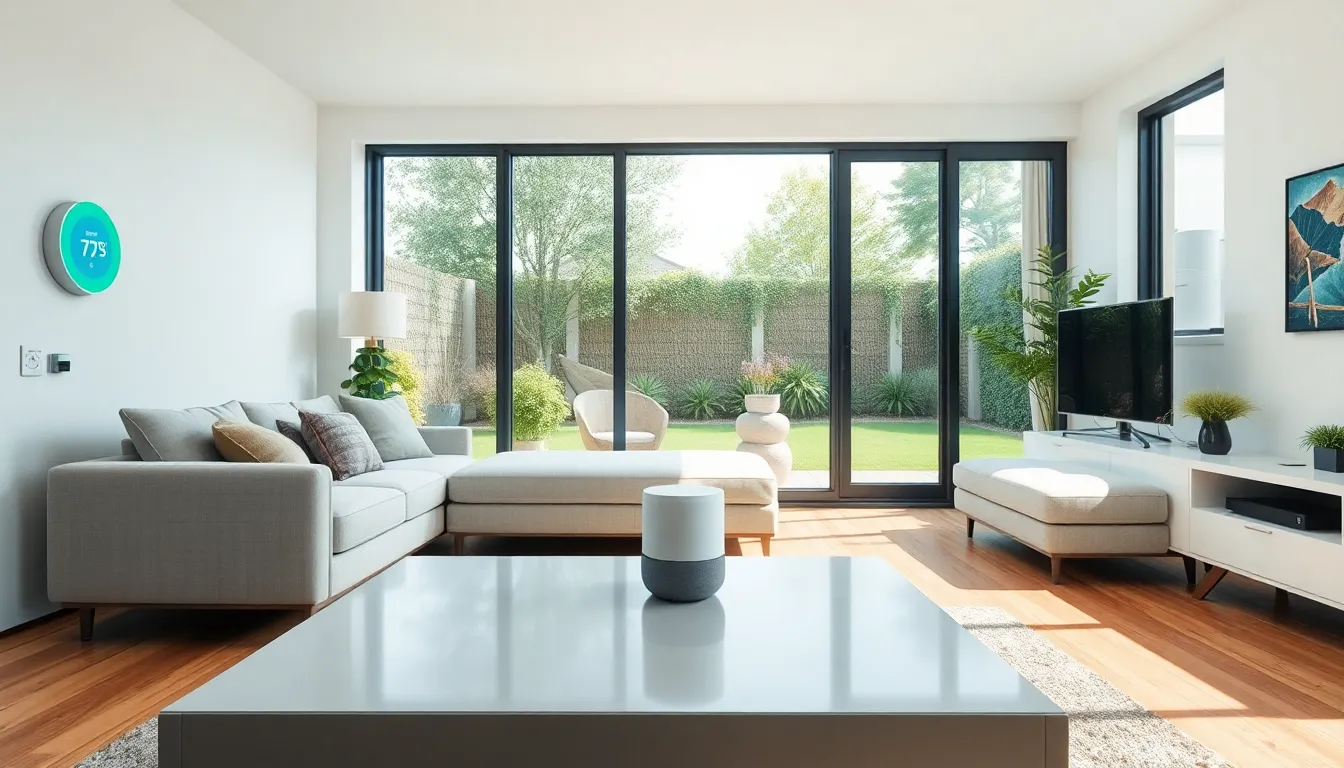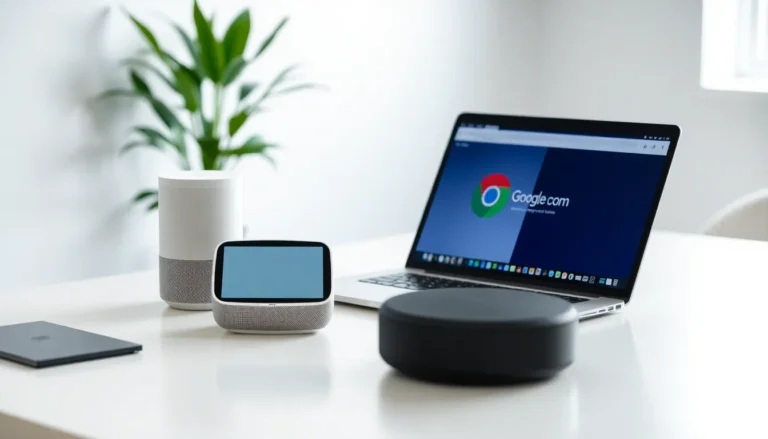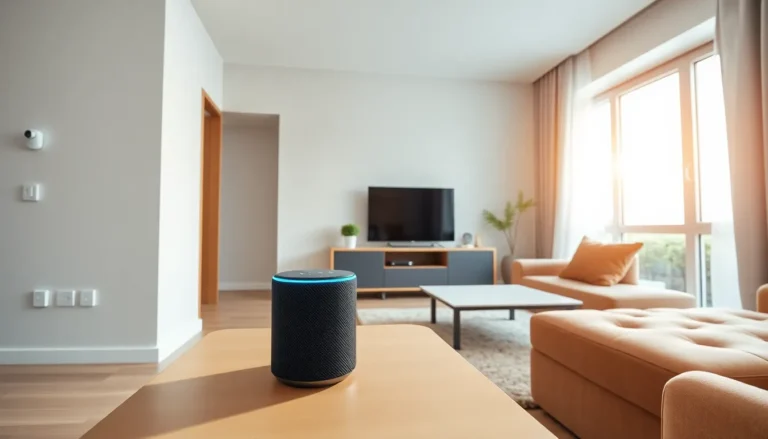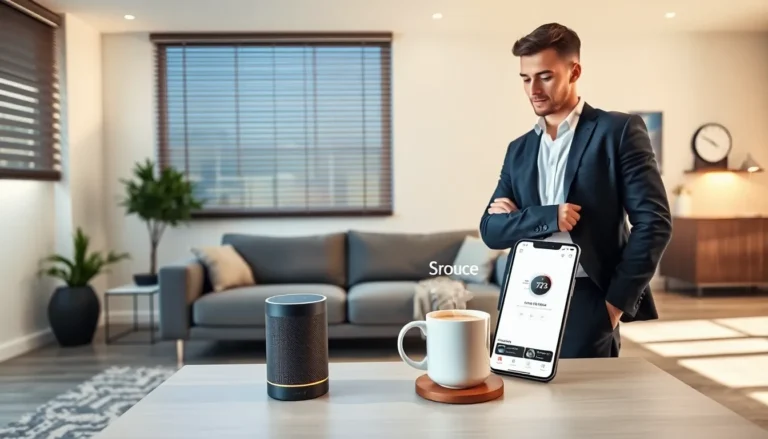Table of Contents
ToggleAs technology rapidly evolves, the concept of home automation is transforming into something far more sophisticated than ever imagined. Future home automation promises to create seamless living environments where convenience, efficiency, and security are at the forefront. Imagine a home that anticipates needs, adjusts settings, and enhances daily routines with minimal effort.
With advancements in artificial intelligence and the Internet of Things, homeowners can expect a level of integration that makes life easier and more enjoyable. From smart appliances that communicate with one another to energy-efficient systems that optimize usage, the future of home automation is not just about gadgets; it’s about redefining how people interact with their living spaces. Embracing these innovations will lead to a smarter, more connected lifestyle that enhances comfort and sustainability.
Overview of Future Home Automation
Future home automation integrates advanced technologies for enhanced living experiences. It emphasizes seamless connectivity among smart devices, enabling households to respond intelligently to occupants’ needs.
- Artificial Intelligence: AI systems analyze user preferences, anticipate actions, and automate tasks. AI can learn individual habits, adjusting settings for lighting, temperature, and security as lifestyles change.
- Internet of Things (IoT): IoT connects various home devices, allowing them to communicate. Smart thermostats, security cameras, and appliances work cohesively, providing efficiency and convenience.
- Voice Control: Voice-activated systems streamline interactions, permitting users to control various functions hands-free. Devices like smart speakers execute commands for lighting, music, and home security.
- Energy Management: Future systems optimize energy consumption through smart meters. These devices monitor usage patterns, enabling energy savings and supporting environmental sustainability.
- Enhanced Security: Advanced security systems utilize real-time monitoring and alerts. Smart locks and cameras enable remote access and surveillance, securing homes effectively.
- Customization: Smart home platforms offer user-friendly interfaces for device management. Customizable settings enhance living conditions, making it easier to create personalized environments.
- Integration with Wearables: Wearable technology connects with home systems for health and wellness monitoring. Fitness trackers can adjust home conditions based on physical activity levels.
- Remote Access: Mobile apps provide control over home systems from anywhere. Users can manage security settings, temperature, and lighting while away.
Future home automation signifies a shift toward more responsive, user-centric living environments. With comprehensive integration of technology, homes will become more intuitive and accommodating.
Key Technologies Shaping Future Home Automation

Future home automation relies on key technologies that enhance convenience and improve overall living experiences. The primary advancements include artificial intelligence, IoT devices, and energy efficiency improvements.
Artificial Intelligence Integration
Artificial intelligence (AI) integration transforms home automation by enabling systems to learn from user behaviors. AI analyzes preferences, automates routine tasks, and optimizes device interactions. For example, smart thermostats adjust temperatures based on historical usage patterns, while voice-activated assistants manage schedules and control devices with simple commands. Enhanced security features, such as facial recognition and predictive analytics, also benefit from AI, providing proactive monitoring and alerts.
IoT Devices and Connectivity
IoT devices establish a seamless connection among home automation systems. Each device communicates with others, creating an integrated ecosystem. Smart appliances like refrigerators, lighting, and thermostats work together to ensure efficiency and convenience. An example includes a smart security system that communicates with motion sensors and door locks, allowing for real-time alerts and remote monitoring through mobile applications. As IoT technology advances, homes become increasingly responsive to occupants’ needs and preferences.
Energy Efficiency Advancements
Energy efficiency advancements play a critical role in future home automation. Smart meters and energy management systems optimize resource usage, promoting cost savings and environmental sustainability. Devices such as smart plugs and intelligent lighting reduce energy waste by adapting to user schedules and preferences. Data analytics further informs energy consumption patterns, enabling homeowners to make informed decisions about their usage. As a result, energy-efficient technologies lead to lower utility bills and a reduced carbon footprint.
Benefits of Future Home Automation
Future home automation offers significant advantages that enhance security and energy efficiency for homeowners. These benefits transform current living spaces into smart, responsive environments.
Enhanced Security Features
Enhanced security features in future home automation systems provide robust protection for residences. Advanced surveillance cameras and sensors offer real-time monitoring, sending alerts to homeowners about unusual activities. Smart locks allow for remote access control, enabling users to grant entry to trusted individuals without physical keys. Integration with motion detectors and alarms ensures prompt responses to potential threats. Enhanced automation will also facilitate remote surveillance, allowing users to monitor their properties anytime, from anywhere. Overall, these features create a safer living environment for families.
Improved Energy Management
Improved energy management is a key benefit of future home automation. Smart meters track energy consumption patterns, providing homeowners with insights into usage and ways to reduce costs. Energy-efficient appliances seamlessly adjust based on real-time data, optimizing performance and minimizing waste. Automated lighting systems can regulate brightness based on occupancy, ensuring lights are only on when needed. Additionally, climate control systems adjust heating and cooling settings according to occupancy patterns, promoting energy savings. These advancements contribute to sustainable living and lower utility bills, enhancing the overall efficiency of modern homes.
Challenges and Considerations
Future home automation presents several challenges and considerations that require careful thought. Addressing these aspects is crucial for creating a secure and efficient living environment.
Privacy and Security Concerns
Privacy and security stand as significant challenges in home automation. Smart devices often collect data, leading to concerns about unauthorized access and data breaches. Securing personal information requires robust encryption and vigilant monitoring of devices. The risk of cyberattacks on interconnected systems increases, necessitating strong security protocols. Regular updates and maintenance of software are essential to protect against vulnerabilities.
Homeowners must also consider who has access to the data—manufacturers, service providers, and third-party applications often collect information that can compromise privacy. Transparent data usage policies and informed consent from users play vital roles in maintaining trust. Implementing multi-factor authentication can further strengthen device security, ensuring only authorized users gain access.
Integration with Existing Systems
Integration with existing systems poses another challenge for future home automation. Many homes contain a mix of older technologies and newer smart devices, complicating compatibility. Systems must communicate effectively, requiring standardized protocols to facilitate seamless integration.
Homeowners should evaluate existing infrastructures, such as HVAC systems and security features, to identify compatibility with new technologies. Upgrading older devices or using intermediary hubs can bridge the gap, allowing smoother integration. Additionally, configuring devices from different manufacturers may require specific applications, which can add complexity to user experience.
As systems evolve, maintaining an adaptable approach ensures a cohesive ecosystem. Reinforcing compatibility through heightened industry standards can improve integration efforts, ultimately enhancing user satisfaction and operational efficiency.
The future of home automation is set to revolutionize how individuals interact with their living spaces. As technology advances homes will become more intuitive and responsive. With AI and IoT at the forefront these systems will not only enhance convenience but also promote sustainability and security.
Homeowners can look forward to a seamless integration of smart devices that learn and adapt to their lifestyles. This shift toward a more connected environment will create personalized experiences while addressing essential concerns like privacy and compatibility. Embracing these innovations will lead to a smarter and more efficient way of living. The journey into the future of home automation promises a lifestyle that is not only comfortable but also sustainable and secure.







